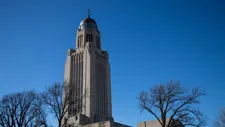LINCOLN — Nebraska’s Appropriations Committee Chair, Sen. Robert Clements, announced that the state’s $432 million budget shortfall leaves little room for new property tax relief in the upcoming two-year budget cycle. The projected financial outlook reveals an ending balance $432 million below the minimum reserve and nearly $490 million lower than projections from August’s special legislative session. The deficit could have been worse without a $200 million transfer from the state’s cash reserve earlier this year.
The shortfall, discussed during Wednesday’s Tax Rate Review Committee meeting, stems from several factors, including $73.7 million in fiscal year 2024-25 deficits that exceeded allocations and $126.8 million in agency requests beyond previous estimates. Additionally, revenue projections from Nebraska’s Economic Forecasting Advisory Board in October anticipate state revenues to fall $141 million below earlier forecasts. The board will convene twice more before lawmakers finalize the state budget in 2025.
If left unaddressed, the deficit could balloon to $1.1 billion by fiscal year 2028-29. While transfers from cash reserves and other funds could partially offset the gap, Clements emphasized that further reductions will be necessary.
Earlier this year, lawmakers spent a month in a special session prioritizing property tax relief, a key focus for Gov. Jim Pillen. The session resulted in a scaled-back plan that provided a 3% increase in statewide relief and capped property tax collections by cities and counties. While Pillen remains committed to reducing property taxes by 50%, Clements said the current numbers don’t allow for further relief measures beyond those already implemented.
Outgoing Revenue Committee Chair Sen. Lou Ann Linehan expressed skepticism, recalling a similar situation in 2017 when an anticipated $1 billion shortfall was resolved through budget cuts and cash reserve transfers. “When the new Legislature gets here in January, they will look at these numbers and think we’re broke,” Linehan said, suggesting the situation might not be as dire as projected.
As Nebraska lawmakers prepare for the next session, addressing the growing budget shortfall will remain a top priority.


















Comments